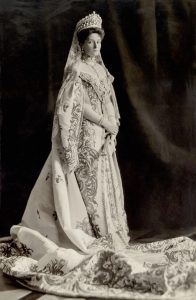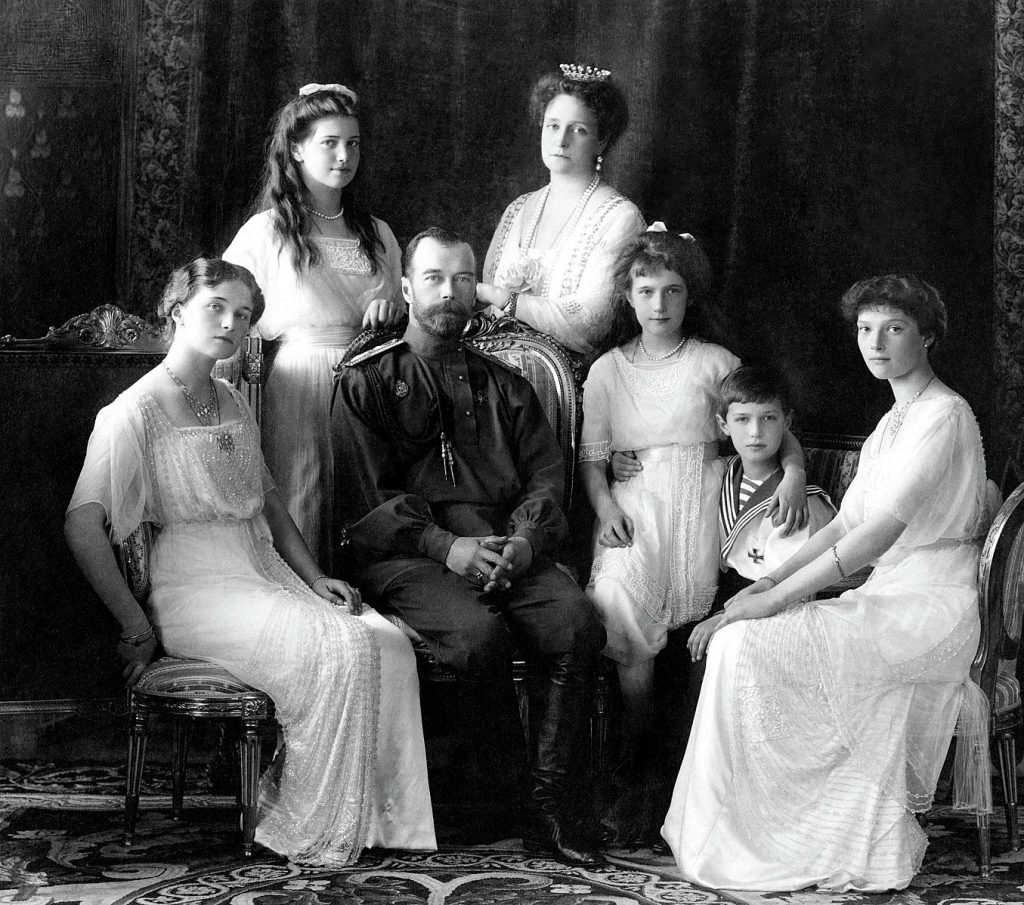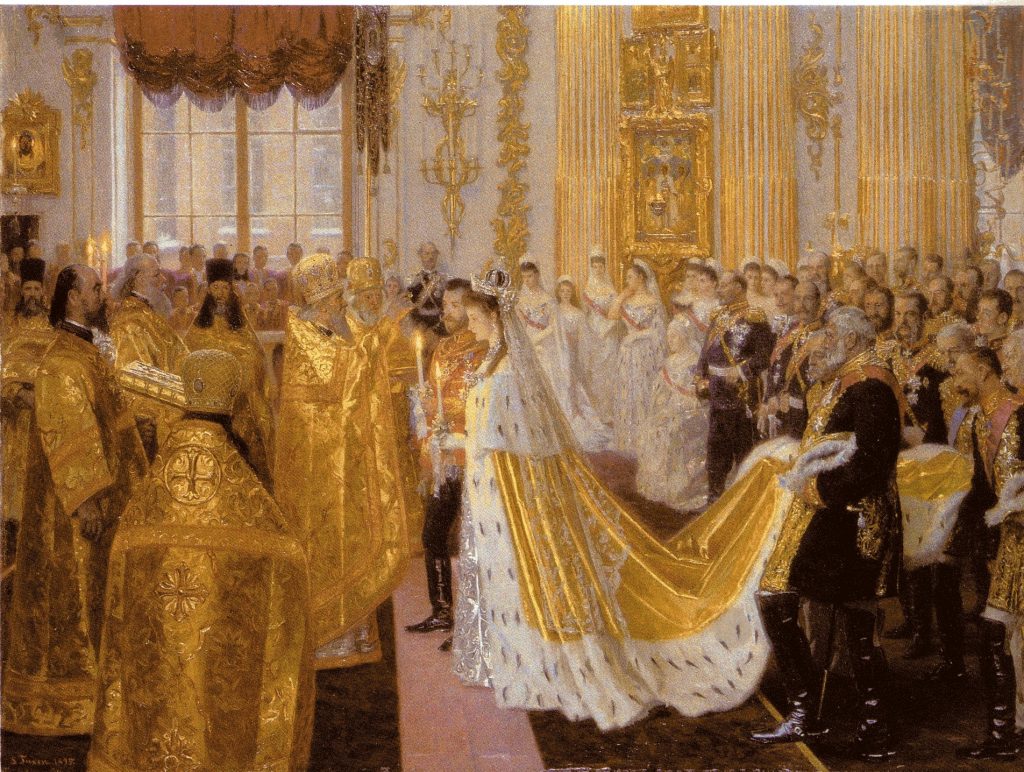When German Princess Alix of Hesse met Grand Duke Nicholas of Russia at her sister’s wedding in 1884, it was love at first sight. The two fell deeply in love as they got to know each other, and they hoped to marry. Nicholas stated in his diary, “My dream is someday to marry Alix H. I have loved her a long while and still deeper and stronger…I resisted my feeling that my dearest dream will come true.”1 While their love blossomed, not only did Alix’s grandmother Queen Victoria of England not approve, but also Nicholas’ parents Tsar Alexander III, and Empress Marie. Queen Victoria eventually did accept the marriage, but the main problem was the Tsar and the Empress. Due to the existing conflict between Russia and Germany, Tsar Alexander III and Empress Marie were vigorously anti-German and had no intention of allowing the relationship.2
That would all be forgotten when Tsar Alexander fell ill and allowed the two to get married.
The Tsar dressed in full dress uniform kneeled in front of Alix and received his blessing, meaning that she and Nicholas were formally betrothed.3 The couple was finally married on November 26, 1894, just weeks after the death of the Tsar. From this point on, Princess Alix of Hesse was now Alexandra Fedodronova Empress of Imperial Russia. Although Alexander had approved of their marriage, the Russian court and the people of Russia would show their disapproval. Due to their marriage being so close to Alexander’s funeral, Alexandra was seen as a bad omen: “She has come to us behind a coffin. She brings misfortune with her.”4 This disapproval would eventually contribute to the end of 300 years of the Romanov dynasty.

Alexandra Fedodronova had the heart of Tsar Nicholas, but she failed to win the hearts of the Russian court. Alexandra was shy and reserved and did not know how to properly communicate, since she barely knew French, the official court language, and had a strong accent when speaking Russian. She also failed to understand her public role at court and rarely led any social scenes or balls. Alexandra was shocked by the love affairs and gossip at these gatherings, and she started to exclude certain noblemen and noblewomen from them who were too scandalous.5 Because of this, few were left on the invitation lists, and St. Petersburg society saw Alexandra as a prude. As for the treatment of the people, Alexandra was a firm believer that the Tsars were divine beings who did not need the approval of the people. Dowager Empress Marie was furious at her behavior since the Imperial family should not be above winning the people’s affection.6 Alexandra would often complain about how the public was indifferent towards her, but Dowager Marie did not pity her since she wasn’t willing to fulfill her part. Alexandra always made sure that Nicholas would never relinquish his power as ruler of Imperial Russia. Alexandra always encouraged Nicholas to be better than all of the famous rulers of Russia and that everyone should bow down before his wisdom.7
Ever since Alexandra married into the Romanov family, she has been met with disapproval and criticism for the actions she has done. The Tsarina’s main goal was to not only marry the man she loved but also to preserve the Romanov Dynasty and keep the tradition alive in Imperial Russia. The way she could truly preserve the Dynasty is by giving Russia a male heir to the throne, but even then she would fail Russia. Alexandra and Nicholas had four daughters: Olga, Tatiana, Maria, and Anastasia. When Olga was first born, there was no worry about Alexandra failing to provide a male heir until the birth of their second daughter Tatiana. Alexandra was distraught and felt shame for having another daughter since the people would not approve.8 After Maria and Anastasia were born, the Russian court and people were disappointed by the lack of a male heir. The Russian people would soon start to believe that she was not blessed by God and cursed to not have a son.9 On August 12, 1904, Alexandra gave birth to Alexei Nikolaevich, meaning that Russia now had a male heir. The hatred towards Alexandra and the wait for a male heir were even recorded in foreign news outlets like the Brisbane Courier from Australia. The news article states that now that Alexei was born, he will relieve her of all the indignities she had suffered.10 The joy of finally having an heir to the throne did not last long, however, since Alexei was diagnosed with Hemophilia. The Tsarina was heartbroken that her only son inherited the disease from her since she was a carrier. After Alexei was diagnosed, she cried and told her nurse how much she prayed that her son would not inherit the cursed illness.11 Although his condition was hidden from the public, the Russian court had another motive to dislike Alexandra. Because of this, she turned to several doctors and also reached out to a mystic healer: Rasputin.

Grigori Rasputin was a priest and mystic from Siberia who would bring a lot of controversy to the Imperial family. Tsarina Alexandra was a firm believer that Rasputin was a gateway between her and God. It was believed that Rasputin could stop Tsarevich’s bleeding by using his eyes to hypnotize the young boy.12 While hypnosis may be medically impossible to completely heal hemophilia, it managed to calm not only Alexei but the Tsarina as well. This allowed the effects of hemophilia to slowly lessen allowing Alexei to heal. While Rasputin’s methods of healing the Tsarevich have always been a mystery, some historians speculate that Rasputin lessened his consumption of aspirin.13 Since Rasputin seemed to have a cure for the young Tsarevich, Alexandra was dazzled and constantly requested his presence. Rasputin managed to gain immense power within the Russian court, which led to him taking advantage of Alexandra’s vulnerable state. Rasputin would claim that without him her son would be dead in six months.14 Rasputin inserted himself into the lives of the Imperial family officially in 1908. The Russian court and people were starting to hear rumors of not only that he was having an affair with the Tsarina, but that he also manipulated her good will to gain political power. These suspicions grew stronger when Russia engaged Germany in war on July 28, 1914.
The outbreak of the Great War was a giant turning point for not only Russia but also for Alexandra. By 1914, the Russian court and people had many reasons to dislike the Tsarina throughout the years, but her German background would come back to haunt her. Alexandra was cousin to German Emperor Wilhelm II, who had declared war on Tsar Nicolas in August. Even Alexandra’s brother Ernest Louis, Grand Duchy of Hesse, and the Rhine were also fighting with the Germans. Although the Tsarina hated the German Emperor, suspicions still grew, and the people believed that she was a German spy.15 Because she was in a position of power and had many relatives associated with Wilhelm, people assumed that she would help the Germans. Rumors that her brother Ernest was hiding in St. Petersburg were starting to spread, as well as that Alexandra and Rasputin were in communication with Kaiser Wilhelm. Rumors of a collaboration between Alexandra and the Germans would only grow stronger and cause more problems for the future of Romanov rule.
When Nicholas traveled to the front line in 1915 to command the army, he left Alexandra as Regent in St. Petersburg. Nicholas was already a controversial leader since the beginning of his reign. He wasn’t popular with the people due to his treatment of the working class and the lack of improvement for their working conditions.16 This caused the first Russian Revolution, or the Revolution of 1905, triggered by a massacre known as “Bloody Sunday.” Leaving Alexandra as regent did not improve the tension that the Russian people felt towards the monarchy. In fact, it was worse since not only was Alexandra disliked, but she, as a “German spy,” was now head of state.
The environment in the Russian court was also starting to become tense since Alexandra made terrible choices when running the government. The Tsarina fired and appointed ministers based on Rasputin’s input on the government.17 These choices ended up affecting the military in a negative way during a crucial time for Russia. Alexei Polivanov was an excellent minister of war who managed to revitalize the military, but because there was a disagreement with Rasputin, he was removed.18 To Alexandra, anyone going against Rasputin was like going against God and would cause misfortune.
As Alexandra replaced more ministers at the insistence of Rasputin, Nicholas was having a difficult time leading the war. Nicholas was failing to lead Russia in World War I and the economy was suffering as well. The war was becoming a burden that led to food shortages and inflation. The poor performance of the military under Alexandra’s leadership caused rumors of some kind of collaboration with the Germans to flourish. The economy was failing, Nicholas was incompetent as a leader, and the many rumors about the Russian monarchy weakened the monarchy. By 1917, conditions worsened. There were several riots over food shortages, with battles in the streets of St. Petersburg. Tsar Nicholas’ response was to send the army and establish order in the city. When the military got involved in the protest, it resulted in shooting the protestors.19 With the government falling apart, the military eventually joined the rebellion, which became the February Revolution. By the time Nicholas arrived back in St. Petersburg, his generals advised him to abdicate the throne putting an end to the Romanov rule.20
On March 15, 1917, Nicholas officially abdicated the throne putting Alexandra in a dangerous position. Alexandra was no longer safe, due to how hated she was by the people. Alexandra’s downfall as Tsarina was caused by her treatment of the Russian people and her German background. There were many attempts to raid the Alexander Palace, but it was successfully guarded.21 After the Russian monarchy collapsed, a provisional government was formed by several political groups with different opinions.22 Eventually, the provisional government would have to face the Bolsheviks led by Vladimir Lenin. As for the royal family, on March 22, they were placed under house arrest in Alexander Palace. The provisional government made sure to interview Alexandra on her involvement in the Russian government as well as Rasputin’s influence. Alexandra confirmed that there was no coalition with the Germans and that Nicholas knew about her political decisions.23 Rasputin’s influence in the Russian monarchy eventually motivated members of the royal family to assassinate him, but there was still suspicion that he was working with the Germans. During this interview, Alexandra revealed that Rasputin was a man of God and that his influence was for the good of Imperial Russia as well as for Tsarevich’s health.24
The provisional government was weak due to the number of political groups involved; but it still wanted to protect the Imperial family. Plans were made to send the Romanovs to Great Britain, due to the growing threats of the Bolsheviks.25 Although it was expected that King George V of England would receive his first cousins Nicholas and Alexandra, he refused since they were unpopular in the United Kingdom. Alexandra’s German background came back to haunt her even after being removed from power since it was also affecting their ability to flee Russia. The provisional government wanted to send the family to France, but British diplomats in France warned them that they would not be welcomed. France was anti-German and because of this, not only did the Russian people believe that Alexandra sided with Germany, but so did the French.26 Since other countries would not accept them, they were relocated to Russia, making it difficult to guarantee their safety. The family was moved to Tobolsk in Siberia in order to get them as far as possible from the capital.
There were many attempts to move the imperial family out of Russia, but a lot of those plans were canceled due to the strong Bolshevik presence. The Provisional government fell after the Bolshevik Revolution in November 1917, which meant that the Imperial family was now the prisoners of the Bolsheviks. In 1918, the family was moved to Bolshevik territory in the city of Ekaterinburg.27 Alexandra and her family went from living in the Alexander and Winter palaces to living in the Ipatiev House, which belonged to a merchant.28 Life was uncertain in the Ipatiev House and was a nightmare. Alexandra feared for her family since they could have been separated and killed. The family was limited to a few privileges, as the guards watched them. Alexandra and her family were no longer seen as God-sent like she believed they were, and no one was bowing down before their wisdom.
Ever since Alexandra married into the Romanov Dynasty, her main goal was to preserve the Russian crown and for it to maintain the respect of the people. Unfortunately, Tsarina Alexandra lacked respect from the Russian people, which eventually affected the monarchy. Although the Tsarina tried to shed her German past, the Russian court and people always held it against her. Since the beginning, she would be called a bad omen for struggling to bear a son, and when she finally did, he was hemophilic. While Alexandra wanted good for Russia and Alexi, she was misguided by Rasputin, which was the final step for the Russian Monarchy to collapse.
On July 17, 1918, Alexandra, Nicholas, and the children were escorted to the basement of the Ipatiev House by Yakov Yurovksy, who was the leader of the Bolshevik group that was guarding them.29 The family and a couple of their servants gather together and twelve gunmen enter the basement. Twelve of the Bolshevik men gun downed Alexandra, Nicholas, the children, and the servants, which resulted in not only the end of the imperial family but officially ended the 300-year rule of the Romanov dynasty.30

Conspiracy theories and mysteries revolve around the death of the Imperial family. As the years went by, some people claimed to be one of the children in order to gain the money of the remaining Romanovs that lived in France. The most notable imposter was Ana Anderson who claimed to be the Tsar’s youngest daughter Anastasia two years after their execution.31 Anderson’s claim caused a lot of commotion for the public, which inspired the 1956 film Anastasia, and the 1997 animated musical Anastasia. However, the bodies of the Imperial family were said to have been thrown in a mineshaft or buried in the woods of Ekaterinburg. This sparked the curiosity of some historians, and in 1979 there were attempts to find the family’s remains in the forest of Ekaterinburg. In 1991, investigators announced that the remains of nine people had been discovered in the forest.32 The Russian Orthodox Church still has its suspicions about the remains belonging to the family so they have not officially been recognized. However, researchers have been able to confirm through DNA tests that the remains were in fact the Imperial family.33 Since it was revealed that the Romanovs remains have been found, any major conspiracy that had the attention of the public, including Ana Anderson’s claim, was now debunked.
While Alexandra and her family could not successfully guarantee stability or respect while they were in power, they were able to do so after their death. In 1981, the Russian Orthodox Church recognized the Tsarina and Tsar as saints and the children as Martyrs.34 As for the Ipatiev House, it was demolished in 1977, but people still visited the area to pay respects to the fallen family. In 2000, there was approval for a church to be built where the house once stood and it would be called the Church on Blood in Honour of All Saints Resplendent in the Russian Land. The basement still remains as part of the constriction for the Orthodox church and was built in honor of the Romanov Family.
- Robert K. Massie, Nicholas and Alexandra (Atheneum, 1967), 27. ↵
- Robert K. Massie, Nicholas and Alexandra (Atheneum, 1967), 27. ↵
- Robert K. Massie, Nicholas and Alexandra (Atheneum, 1967), 42. ↵
- Pierre Gilliard, Thirteen Years at the Russian Court: A Personal Record of the Last Years and Death of the Tsar Nicholas II, and His Family (1921), 4. ↵
- Robert K. Massie, Nicholas and Alexandra (Atheneum, 1967), 216. ↵
- Greg King, The Last Empress : The Life and Times of Alexandra Feodorovna, Tsarina of Russia (Carol Pub. Group, 1994), 93. ↵
- Carolly Erickson, Alexandra : The Last Tsarina (St. Martin’s Press, 2001), 247. ↵
- Carolly Erickson, Alexandra : The Last Tsarina (St. Martin’s Press, 2001), 355. ↵
- Kellogg Durland, Royal Romances of To-Day (Duffield, 1911), 135. ↵
- WOMAN’S CORNER,” Brisbane Courier, October 1, 1904, http://nla.gov.au/nla.news-article19318000. ↵
- Simon Sebag Montefiore, The Romanovs : 1613-1918 (New York: Vintage, 2016), 519. ↵
- Robert K. Massie, Nicholas and Alexandra (Atheneum, 1967), 350. ↵
- “5 Myths and Truths About Rasputin,” Time, accessed November 16, 2021, https://time.com/4606775/5-myths-rasputin/. ↵
- Robert K. Massie, Nicholas and Alexandra (Atheneum, 1967), 350. ↵
- Greg King, The Last Empress : The Life and Times of Alexandra Feodorovna, Tsarina of Russia (Carol Pub. Group, 1994), 223. ↵
- Walter Sablinsky, “Introduction: St. Petersburg Workers before 1905,” in The Road to Bloody Sunday, The Role of Father Gapon and the Petersburg Massacre of 1905 (Princeton University Press, 1976), 3, https://www.jstor.org/stable/j.ctt7zthxn.4. ↵
- Robert K. Massie, Nicholas and Alexandra (Atheneum, 1967), 348. ↵
- Robert K. Massie, Nicholas and Alexandra (Atheneum, 1967), 370. ↵
- Edvard Radzinskii, The Last Tsar : The Life and Death of Nicholas II (Doubleday, 1992), 53. ↵
- Edvard Radzinskii, The Last Tsar : The Life and Death of Nicholas II (Doubleday, 1992), 53. ↵
- Greg King, The Last Empress : The Life and Times of Alexandra Feodorovna, Tsarina of Russia (Carol Pub. Group, 1994), 334. ↵
- “Russian Provisional Government,” Britannica online, accessed November 15, 2021, https://www.britannica.com/topic/Russian-Provisional-Government. ↵
- Greg King, The Last Empress : The Life and Times of Alexandra Feodorovna, Tsarina of Russia (Carol Pub. Group, 1994), 345. ↵
- Greg King, The Last Empress : The Life and Times of Alexandra Feodorovna, Tsarina of Russia (Carol Pub. Group, 1994), 344. ↵
- Greg King, The Last Empress : The Life and Times of Alexandra Feodorovna, Tsarina of Russia (Carol Pub. Group, 1994), 345. ↵
- Greg King, The Last Empress : The Life and Times of Alexandra Feodorovna, Tsarina of Russia (Carol Pub. Group, 1994), 345. ↵
- Greg King, The Last Empress : The Life and Times of Alexandra Feodorovna, Tsarina of Russia (Carol Pub. Group, 1994), 344. ↵
- “Russian Provisional Government,” Britannica online, accessed November 15, 2021, https://www.britannica.com/topic/Russian-Provisional-Government. ↵
- Edvard Radzinskii, The Last Tsar : The Life and Death of Nicholas II (Doubleday, 1992), 63. ↵
- Edmund Walsh, “The Last Days of the Romanovs,” The Atlantic, March 1, 1928, https://www.theatlantic.com/magazine/archive/1928/03/the-last-days-of-the-romanovs/303877/. ↵
- “Top 10 Imposters – TIME,” Time, accessed November 17, 2021, http://content.time.com/time/specials/packages/article/0,28804,1900621_1900618_1900620,00.html. ↵
- Deutsche Welle (www.dw.com), “Russia: Forest Bones Confirmed to Be Last Tsar of Russia and the Romanov Family | DW | 18.07.2020,” DW.COM, accessed November 15, 2021. https://www.dw.com/en/russia-forest-bones-confirmed-to-be-last-tsar-of-russia-and-the-romanov-family/a-54223877. ↵
- Smithsonian Magazine and Brigit Katz, “DNA Analysis Confirms Authenticity of Romanovs’ Remains,” Smithsonian Magazine, accessed November 15, 2021, https://www.smithsonianmag.com/smart-news/dna-analysis-confirms-authenticity-remains-attributed-romanovs-180969674/. ↵
- Deutsche Welle (www.dw.com), “Russia: Forest Bones Confirmed to Be Last Tsar of Russia and the Romanov Family | DW | 18.07.2020,” DW.COM, accessed November 15, 2021, https://www.dw.com/en/russia-forest-bones-confirmed-to-be-last-tsar-of-russia-and-the-romanov-family/a-54223877. ↵




19 comments
Sydney Nieto
Good article, I especially like the cover picture on this one. I do think how it’s crazy to thing that the death of the royal family had ended “300-year rule of the Romanov dynasty.” It does suck how Alexandra wanted to have the trust of the people after her marriage, but her German past came to haunt her in the end.
Jared Sherer
Ms.Gonzalez wrote about an obscure historical figure and brings her to life for the reader. Very well done. It is a cliche that one has to earn respect, and Alexandra did not earn the respect of the Russian people, mainly because she did not want to. She also did not believe she needed to, especially after making her acquaintance with Rasputin. Since the people did not respect her (Nicholas did not strive to earn the people’s respect either.), it was easier for the revolutions of 1917 to occur within Russia. It eventually led to the deaths of the entire remaining Romanov family, tragically. The article by Ms. Gonzalez goes into some detail as to Alexandra’s history with Tsar Nicholas and his family, but also into the family’s demise at the hands of the Bolsheviks. It brings some clarity to that time of upheaval in Russian history, and also provides a bit of the reasons behind the earth-shattering changes that took place during that time.
Noelia Torres Guillen
This was such a great article, it had good information that helped me to learn more about the Russian history. It is frustrating how Alexandra was always disapproved by the people mostly because she was German. No matter what she did there was always criticism. This article also briefly talks about Rasputin and is an important player in the fall of the empire. The ending reminded me of this saying that basically states that people don’t appreciate you until you are gone, and this is exactly what happened to Alexandra and her family.
Jaedon E
Great article! A lot of informational facts about their relationship and the effects around them. One thing I would like to mention is that I do give them credit on continuing to have love for each other even though their parents didn’t agree with it.
Overall great article!
Sofia Perez
I really liked this article, very interesting! Alexandra had a German background and was later put in charge when King Nicholas was away; however, during her regent, increased conflicts. I have read about the Romanov family and the pressure Tsarina Alexandra had to give birth to a son. When she finally had Alexi in 1904, the royal family found out that he had hemophilia. I have read about Rasputin but did not realize how involved he actually was with the royal family.
Fatima Esparza
Your article taught me a lot about the last Tsarina of Russia. I never knew how much the Russian people disliked her. Before reading your article, I thought the only problem in the Russian monarchy that led to its downfall was Tsar Nicholas and his involvement with Rasputin. Now I see that Alexandra was the one who got involved with Rasputin, and he led her to destroy the remaining trust some people had in the Romanov family.
Kelly Arevalo
Hello Paulina! Really good article. I like the way of your writing, it was entertaining and very educative. I think it is really interesting that you wrote this from the perspective of the tsarina, and how her actions and lacking contributed to the end of the Russian dynasty. I really enjoyed reading this. Good job!
Kristen Leary
This was a fascinating article! It’s so interesting to see to what extent royal relations and ties have on a country. Today we mainly see royal family members as celebrities who are often seen doing charity work. But it wasn’t long ago that monarchs ruled countries and made alliances through marriages. It’s so heartbreaking to read about what happened to the Romanov family, but interesting to discover how attitudes towards Alexandra built up to that. I had no idea that the public disliked her so much, and given her German background during the time of war just thickens the plot. Well done!
Vianne Beltran
Hi Paulina,
The fall of the Romanovs is always a fascinating part of history for me. There are so many parts of their reign that people will point to as the cause of the end. The Tsarina’s relationship with Rasputin is one of these parts that is interesting to examine. You did an excellent job at describing it. The Tsarina’s loneliness and the anti-German sentiment she faced was clearly exploited by Rasputin.
Aurora Torres
Loved reading your article was interesting to know some facts as to what happened. I really did not know what happened during this time when the Romanov dynasty ended. It is so sad to read that after 300 years of ruling Russia it was over so quickly. I can understand that it stared with Nicholas marrying Alexandra because she was German, and they thought that it was sign from God that it was bad. Also, learning that Nicholas really did not know much about running an empire and destroying it with whatever Alexandra told him to do.Another reason not being able to bare a son and when she did they hid the health issue he had which compromised things with Rasputin and the rumors going around regarding his wife. Everything that was happening in Russia regarding the Great War Nicholas made things worse by not helping his people that were starving and in need of help. I guess if he would o made better choices for Russia and the people he might have been able to save the Romanov Dynasty but than again people wanted different things for Russia some people didn’t agree but whatever the outcome Russia was going to be different. thanks for your article it helped to understand better if the situation.